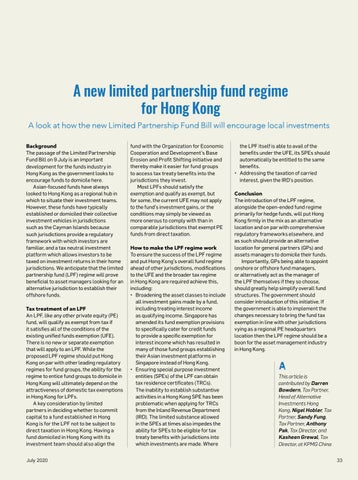A new limited partnership fund regime for Hong Kong A look at how the new Limited Partnership Fund Bill will encourage local investments Background The passage of the Limited Partnership Fund Bill on 9 July is an important development for the funds industry in Hong Kong as the government looks to encourage funds to domicile here. Asian-focused funds have always looked to Hong Kong as a regional hub in which to situate their investment teams. However, these funds have typically established or domiciled their collective investment vehicles in jurisdictions such as the Cayman Islands because such jurisdictions provide a regulatory framework with which investors are familiar, and a tax neutral investment platform which allows investors to be taxed on investment returns in their home jurisdictions. We anticipate that the limited partnership fund (LPF) regime will prove beneficial to asset managers looking for an alternative jurisdiction to establish their offshore funds. Tax treatment of an LPF An LPF, like any other private equity (PE) fund, will qualify as exempt from tax if it satisfies all of the conditions of the existing unified funds exemption (UFE). There is no new or separate exemption that will apply to an LPF. While the proposed LPF regime should put Hong Kong on par with other leading regulatory regimes for fund groups, the ability for the regime to entice fund groups to domicile in Hong Kong will ultimately depend on the attractiveness of domestic tax exemptions in Hong Kong for LPFs. A key consideration by limited partners in deciding whether to commit capital to a fund established in Hong Kong is for the LPF not to be subject to direct taxation in Hong Kong. Having a fund domiciled in Hong Kong with its investment team should also align the July 2020
fund with the Organization for Economic Cooperation and Development’s Base Erosion and Profit Shifting initiative and thereby make it easier for fund groups to access tax treaty benefits into the jurisdictions they invest. Most LPFs should satisfy the exemption and qualify as exempt, but for some, the current UFE may not apply to the fund’s investment gains, or the conditions may simply be viewed as more onerous to comply with than in comparable jurisdictions that exempt PE funds from direct taxation. How to make the LPF regime work To ensure the success of the LPF regime and put Hong Kong’s overall fund regime ahead of other jurisdictions, modifications to the UFE and the broader tax regime in Hong Kong are required achieve this, including: • Broadening the asset classes to include all investment gains made by a fund, including treating interest income as qualifying income. Singapore has amended its fund exemption provisions to specifically cater for credit funds to provide a specific exemption for interest income which has resulted in many of those fund groups establishing their Asian investment platforms in Singapore instead of Hong Kong. • Ensuring special purpose investment entities (SPEs) of the LPF can obtain tax residence certificates (TRCs). The inability to establish substantive activities in a Hong Kong SPE has been problematic when applying for TRCs from the Inland Revenue Department (IRD). The limited substance allowed in the SPEs at times also impedes the ability for SPEs to be eligible for tax treaty benefits with jurisdictions into which investments are made. Where
the LPF itself is able to avail of the benefits under the UFE, its SPEs should automatically be entitled to the same benefits. • Addressing the taxation of carried interest, given the IRD’s position. Conclusion The introduction of the LPF regime, alongside the open-ended fund regime primarily for hedge funds, will put Hong Kong firmly in the mix as an alternative location and on par with comprehensive regulatory frameworks elsewhere, and as such should provide an alternative location for general partners (GPs) and assets managers to domicile their funds. Importantly, GPs being able to appoint onshore or offshore fund managers, or alternatively act as the manager of the LPF themselves if they so choose, should greatly help simplify overall fund structures. The government should consider introduction of this initiative. If the government is able to implement the changes necessary to bring the fund tax exemption in line with other jurisdictions vying as a regional PE headquarters location then the LPF regime should be a boon for the asset management industry in Hong Kong.
This article is contributed by Darren Bowdern, Tax Partner, Head of Alternative Investments Hong Kong, Nigel Hobler, Tax Partner, Sandy Fung, Tax Partner, Anthony Pak , Tax Director, and Kasheen Grewal, Tax Director, at KPMG China 33
